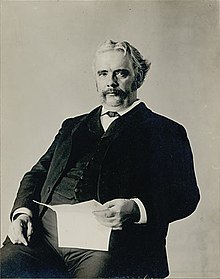William John McGee
William John McGee | |
|---|---|
 McGee in 1900 | |
| Born | April 17, 1853 Farley, Iowa, United States |
| Died | September 4, 1912 (aged 59) Washington, DC, U.S. |
| Nationality | American |
| Spouse | |
| Children | 3 |
| Scientific career | |
| Fields | Geology, anthropology, and ethnology |
William John McGee, LL.D. (April 17, 1853 – September 4, 1912) was an American inventor, geologist, anthropologist, and ethnologist, born in Farley, Iowa.[1]
Biography
While largely self-taught, McGee attended a rural one-room schoolhouse north of Farley during the four winter months from about 1858 to 1867.[2] He devoted his early years to reading law and to surveying.[3] He invented and patented several improvements on agricultural implements.[3]
He subsequently turned his attention to geology.[3] In 1877–1881, he executed a topographic and geological survey of 17,000 square miles (44,030 km2) in northeastern Iowa.[4][5][6] He then undertook an examination of the loess of the Mississippi Valley, researched the great Quaternary lakes of Nevada and California and studied a recent fault movement in the middle Atlantic slope.[3]
He was appointed geologist for the United States Geological Survey (USGS) in 1881. In 1884 McGee authored the article Map of the United States exhibiting the present status of knowledge relating to the areal distribution of geologic groups for the USGS Journal.[7] While with the USGS, McGee travelled to Charleston, South Carolina, in 1886 for the purpose of studying the earthquake disturbances in its vicinity.
McGee was ethnologist in charge of the Bureau of American Ethnology from 1893 to 1903. In 1895, he explored the Isla del Tiburón, Gulf of California, home of the Seri Indians.[8] In 1904 he was chief of the department of anthropology that organized the "Anthropology Days" at the 1904 Summer Olympics / Louisiana Purchase Exposition, the 1904 World's Fair.[9] In 1907 he was appointed a member of the Inland Waterways Commission by President Roosevelt.[10] His other prominent positions were: acting president of the American Association for the Advancement of Science (1897–1898); president of the American Anthropological Association (1902–1912); and president of the National Geographic Society (1904–1905).
McGee was also a founding member of the Geological Society of America[11] and was the first editor of The Geological Society of America Bulletin.,[12] in 1890[13]
Married to Anita Newcomb McGee in 1888, McGee had three children. He died in Washington, DC of cancer on September 4, 1912.[14]
Works
His publications include:
- The Pleistocene History of Northeastern Iowa (1889)
- The Geology of Chesapeake Bay (1888)
- The Siouan Indians (1895)
- Primitive Trephining (1897)
- The Seri Indians (1899)
- Primitive Numbers (1901)
- Soil Erosion (1911)
- Wells and Subsoil Water (1913)
References
- ^ "BIOGRAPHIES OF GEOLOGISTS". Ohio State University Libraries. Retrieved 2011-06-25.
- ^ N.W. McGee. "Lincoln School". National Park Service. Retrieved 2017-01-01. with photos
- ^ a b c d Wilson, J. G.; Fiske, J., eds. (1900). . Appletons' Cyclopædia of American Biography. New York: D. Appleton.
- ^ McGee, W.J. and Call, R.E. 1882. "On the löss and associated deposits of Des Moines, Iowa." The American Journal of Science, 3rd Series, Whole no. 124, 24(141):202–223.
- ^ McGee, W.J. 1884. "The drainage system and the distribution of loess of Eastern Iowa." Bulletin of the Philosophical Society of Washington 6:93–97.
- ^ McGee, W.J. 1891. "The Pleistocene history of northeastern Iowa." In: Powell, J.W. (ed), Eleventh Annual Report of the Director of the United States Geological Survey, Part 1: 1889–1890, pp. 199–577.
- ^ "Map of the United States exhibiting the present status of knowledge relating to the areal distribution of geologic groups". U.S. Geological Survey Annual report 5: 34–41. 1884.
- ^ McGee, W.J. and Johnson, W.D. 1896. Seriland. The National Geographic Magazine 7(4):125–133.
- ^ Nate DiMeo, Olympic-Sized Racism, Slate.com
- ^ Donald J. Pisani, Water Planning in the Progressive Era: The Inland Waterways Commission Reconsidered, Journal of Policy History 18.4 (2006) pp.389–418
- ^ Fairchild, Herman LeRoy, 1932, The Geological Society of America 1888–1930, A Chapter in Earth Science History.
- ^ Fairchild, Herman LeRoy, 1932, The Geological Society of America 1888–1930, A Chapter in Earth Science History, p. 127.
- ^ Eckel, Edwin B., The Geological Society of America – Life History of a Learned Society, p. 90, ISBN 978-0-8137-1155-3.
- ^ http://community.geosociety.org/blogs/justin-samuel/2013/09/13/the-geological-society-of-america-and-its-founders-william-john-mcgee
External links
- Works by William John McGee at Project Gutenberg
- Works by or about William John McGee at the Internet Archive
- Works by William John McGee at LibriVox (public domain audiobooks)

